Partnering in a Specific Case Study of Colorectal Cancer
VerifiedAdded on 2023/04/22
|10
|2451
|469
AI Summary
This case study analysis focuses on the experience of John, diagnosed with colorectal cancer, and the role of Specialists Cancer Nurse in managing and treating the disease. The discussion covers discharge planning, collaborative approaches to education and planning for self-management, and the importance of early intervention methods. The article emphasizes the role of an SCN in perceiving susceptibility, threat, and severity to bring about behavioral change in the patient.
Contribute Materials
Your contribution can guide someone’s learning journey. Share your
documents today.
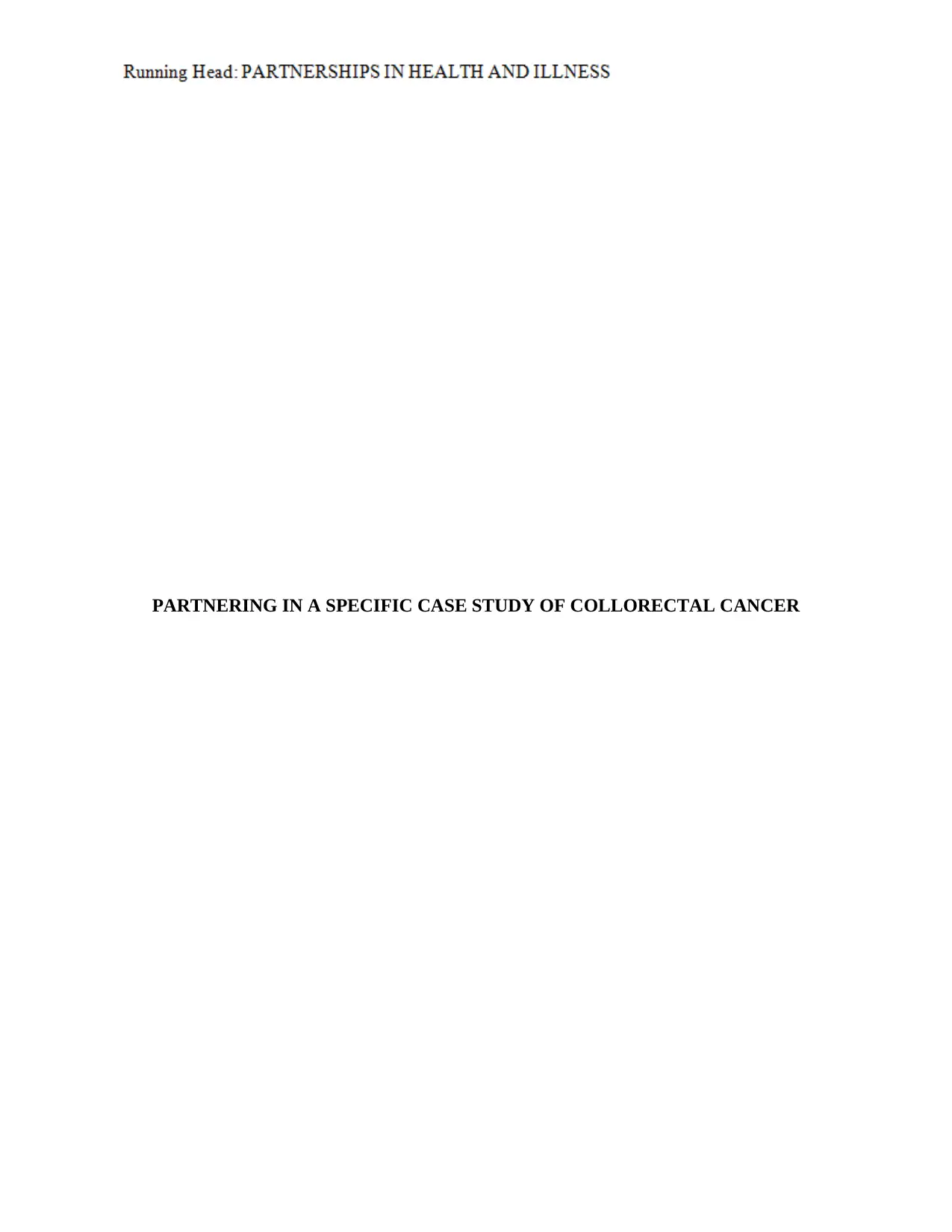
PARTNERING IN A SPECIFIC CASE STUDY OF COLLORECTAL CANCER
Secure Best Marks with AI Grader
Need help grading? Try our AI Grader for instant feedback on your assignments.
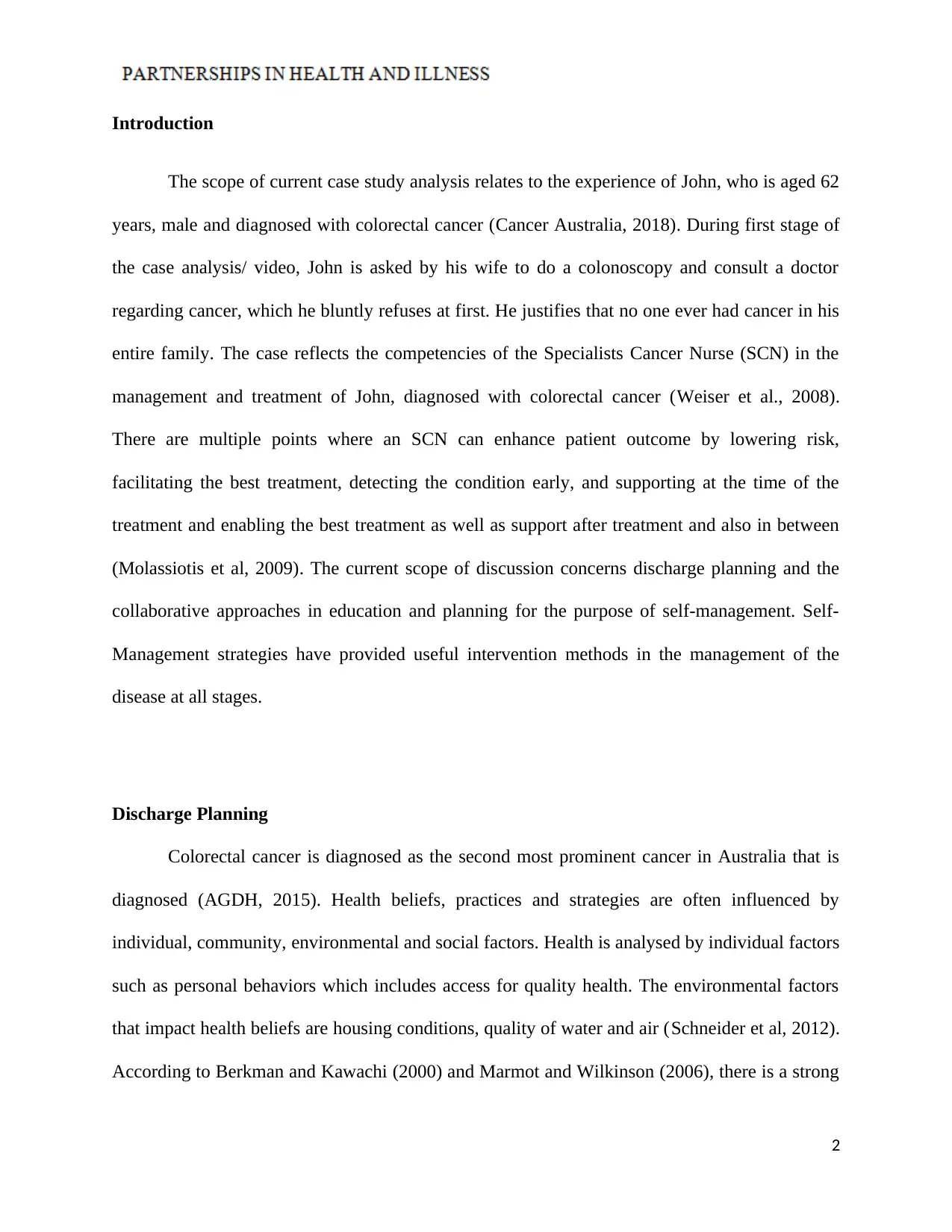
Introduction
The scope of current case study analysis relates to the experience of John, who is aged 62
years, male and diagnosed with colorectal cancer (Cancer Australia, 2018). During first stage of
the case analysis/ video, John is asked by his wife to do a colonoscopy and consult a doctor
regarding cancer, which he bluntly refuses at first. He justifies that no one ever had cancer in his
entire family. The case reflects the competencies of the Specialists Cancer Nurse (SCN) in the
management and treatment of John, diagnosed with colorectal cancer (Weiser et al., 2008).
There are multiple points where an SCN can enhance patient outcome by lowering risk,
facilitating the best treatment, detecting the condition early, and supporting at the time of the
treatment and enabling the best treatment as well as support after treatment and also in between
(Molassiotis et al, 2009). The current scope of discussion concerns discharge planning and the
collaborative approaches in education and planning for the purpose of self-management. Self-
Management strategies have provided useful intervention methods in the management of the
disease at all stages.
Discharge Planning
Colorectal cancer is diagnosed as the second most prominent cancer in Australia that is
diagnosed (AGDH, 2015). Health beliefs, practices and strategies are often influenced by
individual, community, environmental and social factors. Health is analysed by individual factors
such as personal behaviors which includes access for quality health. The environmental factors
that impact health beliefs are housing conditions, quality of water and air (Schneider et al, 2012).
According to Berkman and Kawachi (2000) and Marmot and Wilkinson (2006), there is a strong
2
The scope of current case study analysis relates to the experience of John, who is aged 62
years, male and diagnosed with colorectal cancer (Cancer Australia, 2018). During first stage of
the case analysis/ video, John is asked by his wife to do a colonoscopy and consult a doctor
regarding cancer, which he bluntly refuses at first. He justifies that no one ever had cancer in his
entire family. The case reflects the competencies of the Specialists Cancer Nurse (SCN) in the
management and treatment of John, diagnosed with colorectal cancer (Weiser et al., 2008).
There are multiple points where an SCN can enhance patient outcome by lowering risk,
facilitating the best treatment, detecting the condition early, and supporting at the time of the
treatment and enabling the best treatment as well as support after treatment and also in between
(Molassiotis et al, 2009). The current scope of discussion concerns discharge planning and the
collaborative approaches in education and planning for the purpose of self-management. Self-
Management strategies have provided useful intervention methods in the management of the
disease at all stages.
Discharge Planning
Colorectal cancer is diagnosed as the second most prominent cancer in Australia that is
diagnosed (AGDH, 2015). Health beliefs, practices and strategies are often influenced by
individual, community, environmental and social factors. Health is analysed by individual factors
such as personal behaviors which includes access for quality health. The environmental factors
that impact health beliefs are housing conditions, quality of water and air (Schneider et al, 2012).
According to Berkman and Kawachi (2000) and Marmot and Wilkinson (2006), there is a strong
2
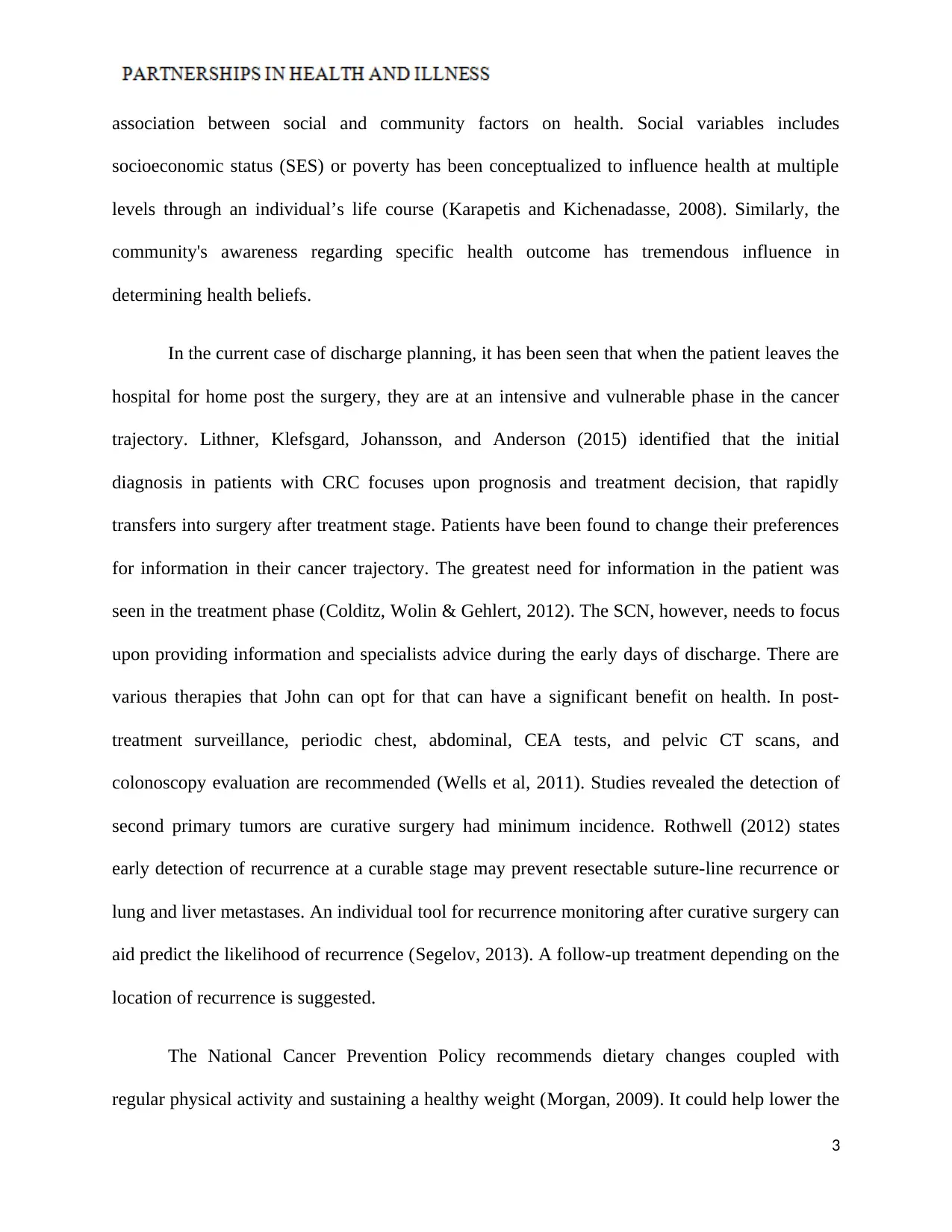
association between social and community factors on health. Social variables includes
socioeconomic status (SES) or poverty has been conceptualized to influence health at multiple
levels through an individual’s life course (Karapetis and Kichenadasse, 2008). Similarly, the
community's awareness regarding specific health outcome has tremendous influence in
determining health beliefs.
In the current case of discharge planning, it has been seen that when the patient leaves the
hospital for home post the surgery, they are at an intensive and vulnerable phase in the cancer
trajectory. Lithner, Klefsgard, Johansson, and Anderson (2015) identified that the initial
diagnosis in patients with CRC focuses upon prognosis and treatment decision, that rapidly
transfers into surgery after treatment stage. Patients have been found to change their preferences
for information in their cancer trajectory. The greatest need for information in the patient was
seen in the treatment phase (Colditz, Wolin & Gehlert, 2012). The SCN, however, needs to focus
upon providing information and specialists advice during the early days of discharge. There are
various therapies that John can opt for that can have a significant benefit on health. In post-
treatment surveillance, periodic chest, abdominal, CEA tests, and pelvic CT scans, and
colonoscopy evaluation are recommended (Wells et al, 2011). Studies revealed the detection of
second primary tumors are curative surgery had minimum incidence. Rothwell (2012) states
early detection of recurrence at a curable stage may prevent resectable suture-line recurrence or
lung and liver metastases. An individual tool for recurrence monitoring after curative surgery can
aid predict the likelihood of recurrence (Segelov, 2013). A follow-up treatment depending on the
location of recurrence is suggested.
The National Cancer Prevention Policy recommends dietary changes coupled with
regular physical activity and sustaining a healthy weight (Morgan, 2009). It could help lower the
3
socioeconomic status (SES) or poverty has been conceptualized to influence health at multiple
levels through an individual’s life course (Karapetis and Kichenadasse, 2008). Similarly, the
community's awareness regarding specific health outcome has tremendous influence in
determining health beliefs.
In the current case of discharge planning, it has been seen that when the patient leaves the
hospital for home post the surgery, they are at an intensive and vulnerable phase in the cancer
trajectory. Lithner, Klefsgard, Johansson, and Anderson (2015) identified that the initial
diagnosis in patients with CRC focuses upon prognosis and treatment decision, that rapidly
transfers into surgery after treatment stage. Patients have been found to change their preferences
for information in their cancer trajectory. The greatest need for information in the patient was
seen in the treatment phase (Colditz, Wolin & Gehlert, 2012). The SCN, however, needs to focus
upon providing information and specialists advice during the early days of discharge. There are
various therapies that John can opt for that can have a significant benefit on health. In post-
treatment surveillance, periodic chest, abdominal, CEA tests, and pelvic CT scans, and
colonoscopy evaluation are recommended (Wells et al, 2011). Studies revealed the detection of
second primary tumors are curative surgery had minimum incidence. Rothwell (2012) states
early detection of recurrence at a curable stage may prevent resectable suture-line recurrence or
lung and liver metastases. An individual tool for recurrence monitoring after curative surgery can
aid predict the likelihood of recurrence (Segelov, 2013). A follow-up treatment depending on the
location of recurrence is suggested.
The National Cancer Prevention Policy recommends dietary changes coupled with
regular physical activity and sustaining a healthy weight (Morgan, 2009). It could help lower the
3
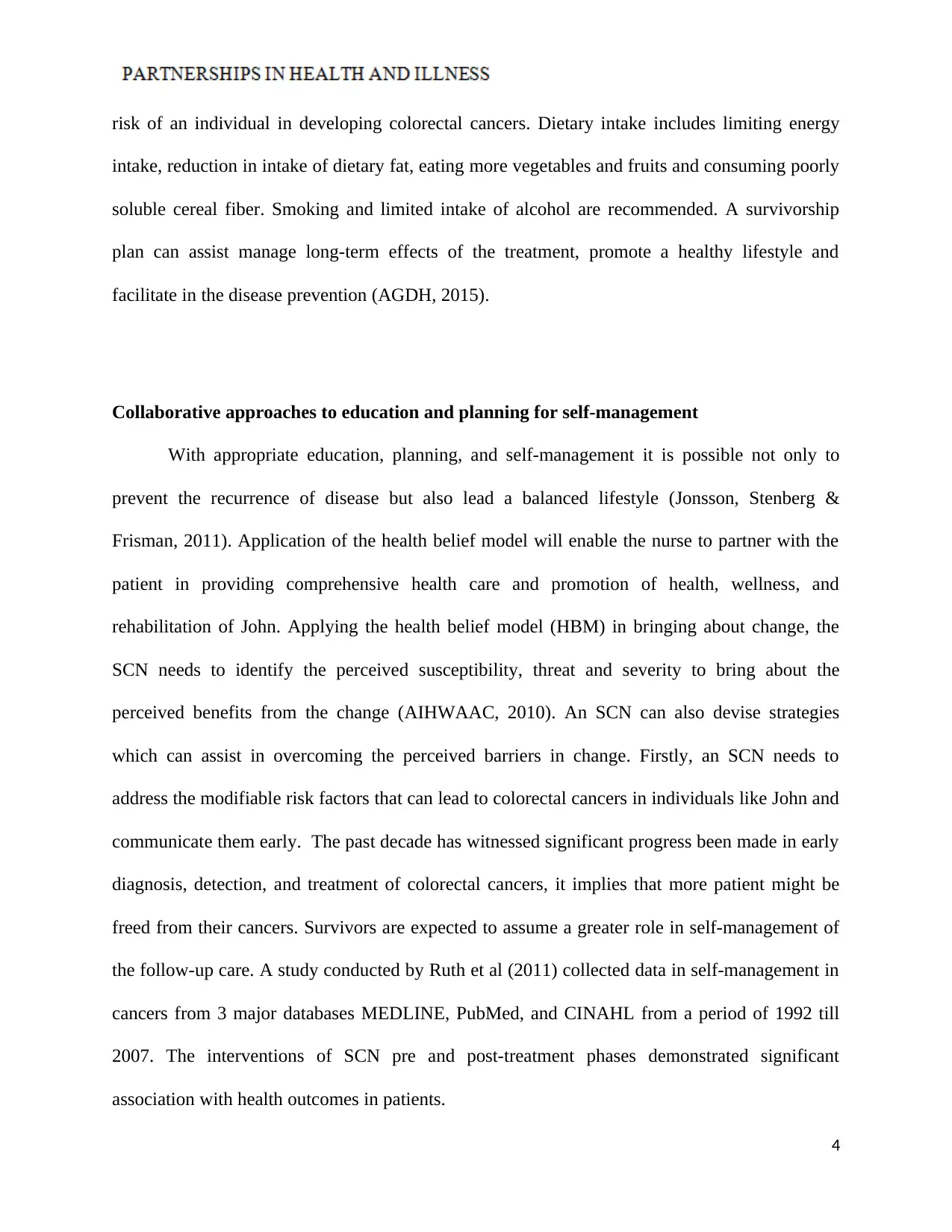
risk of an individual in developing colorectal cancers. Dietary intake includes limiting energy
intake, reduction in intake of dietary fat, eating more vegetables and fruits and consuming poorly
soluble cereal fiber. Smoking and limited intake of alcohol are recommended. A survivorship
plan can assist manage long-term effects of the treatment, promote a healthy lifestyle and
facilitate in the disease prevention (AGDH, 2015).
Collaborative approaches to education and planning for self-management
With appropriate education, planning, and self-management it is possible not only to
prevent the recurrence of disease but also lead a balanced lifestyle (Jonsson, Stenberg &
Frisman, 2011). Application of the health belief model will enable the nurse to partner with the
patient in providing comprehensive health care and promotion of health, wellness, and
rehabilitation of John. Applying the health belief model (HBM) in bringing about change, the
SCN needs to identify the perceived susceptibility, threat and severity to bring about the
perceived benefits from the change (AIHWAAC, 2010). An SCN can also devise strategies
which can assist in overcoming the perceived barriers in change. Firstly, an SCN needs to
address the modifiable risk factors that can lead to colorectal cancers in individuals like John and
communicate them early. The past decade has witnessed significant progress been made in early
diagnosis, detection, and treatment of colorectal cancers, it implies that more patient might be
freed from their cancers. Survivors are expected to assume a greater role in self-management of
the follow-up care. A study conducted by Ruth et al (2011) collected data in self-management in
cancers from 3 major databases MEDLINE, PubMed, and CINAHL from a period of 1992 till
2007. The interventions of SCN pre and post-treatment phases demonstrated significant
association with health outcomes in patients.
4
intake, reduction in intake of dietary fat, eating more vegetables and fruits and consuming poorly
soluble cereal fiber. Smoking and limited intake of alcohol are recommended. A survivorship
plan can assist manage long-term effects of the treatment, promote a healthy lifestyle and
facilitate in the disease prevention (AGDH, 2015).
Collaborative approaches to education and planning for self-management
With appropriate education, planning, and self-management it is possible not only to
prevent the recurrence of disease but also lead a balanced lifestyle (Jonsson, Stenberg &
Frisman, 2011). Application of the health belief model will enable the nurse to partner with the
patient in providing comprehensive health care and promotion of health, wellness, and
rehabilitation of John. Applying the health belief model (HBM) in bringing about change, the
SCN needs to identify the perceived susceptibility, threat and severity to bring about the
perceived benefits from the change (AIHWAAC, 2010). An SCN can also devise strategies
which can assist in overcoming the perceived barriers in change. Firstly, an SCN needs to
address the modifiable risk factors that can lead to colorectal cancers in individuals like John and
communicate them early. The past decade has witnessed significant progress been made in early
diagnosis, detection, and treatment of colorectal cancers, it implies that more patient might be
freed from their cancers. Survivors are expected to assume a greater role in self-management of
the follow-up care. A study conducted by Ruth et al (2011) collected data in self-management in
cancers from 3 major databases MEDLINE, PubMed, and CINAHL from a period of 1992 till
2007. The interventions of SCN pre and post-treatment phases demonstrated significant
association with health outcomes in patients.
4
Secure Best Marks with AI Grader
Need help grading? Try our AI Grader for instant feedback on your assignments.
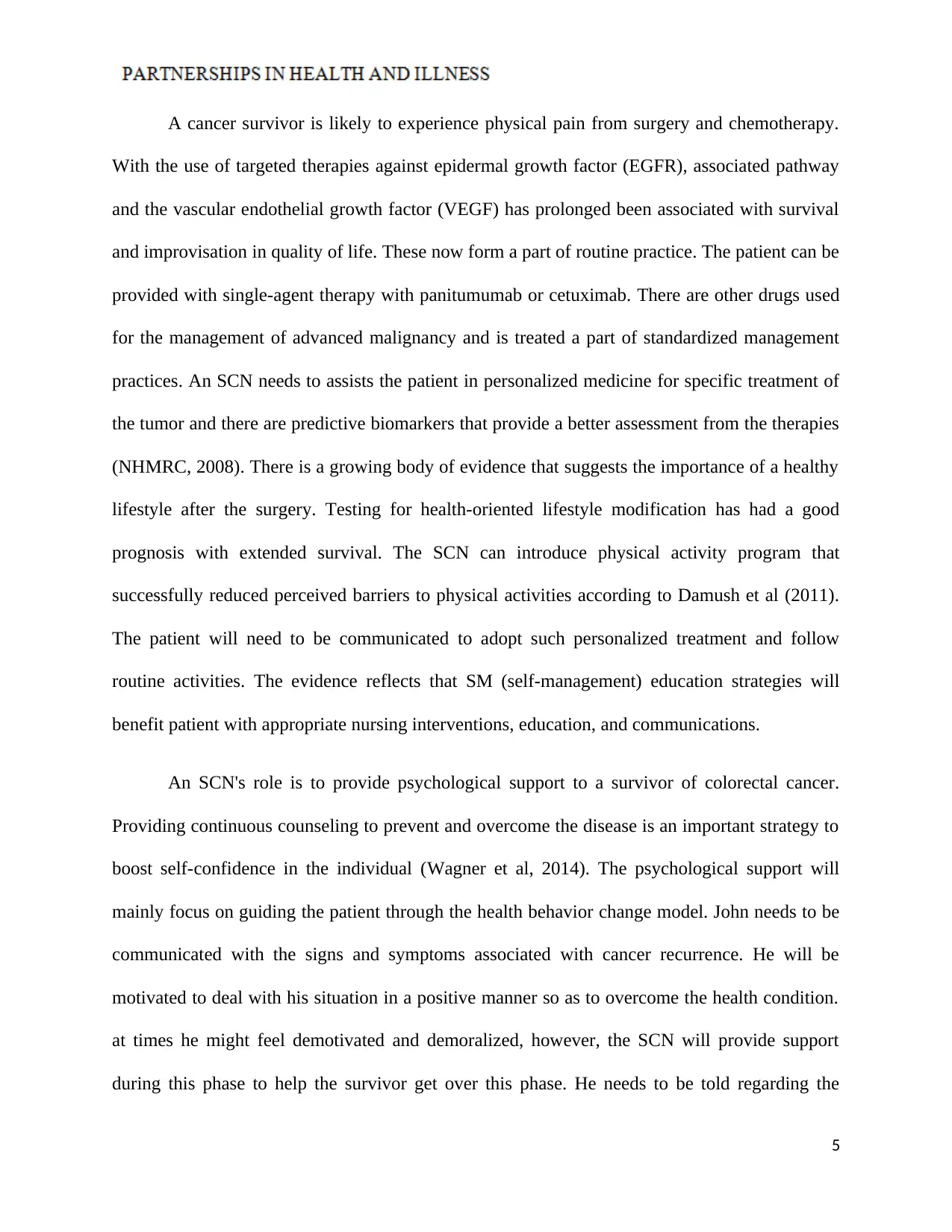
A cancer survivor is likely to experience physical pain from surgery and chemotherapy.
With the use of targeted therapies against epidermal growth factor (EGFR), associated pathway
and the vascular endothelial growth factor (VEGF) has prolonged been associated with survival
and improvisation in quality of life. These now form a part of routine practice. The patient can be
provided with single-agent therapy with panitumumab or cetuximab. There are other drugs used
for the management of advanced malignancy and is treated a part of standardized management
practices. An SCN needs to assists the patient in personalized medicine for specific treatment of
the tumor and there are predictive biomarkers that provide a better assessment from the therapies
(NHMRC, 2008). There is a growing body of evidence that suggests the importance of a healthy
lifestyle after the surgery. Testing for health-oriented lifestyle modification has had a good
prognosis with extended survival. The SCN can introduce physical activity program that
successfully reduced perceived barriers to physical activities according to Damush et al (2011).
The patient will need to be communicated to adopt such personalized treatment and follow
routine activities. The evidence reflects that SM (self-management) education strategies will
benefit patient with appropriate nursing interventions, education, and communications.
An SCN's role is to provide psychological support to a survivor of colorectal cancer.
Providing continuous counseling to prevent and overcome the disease is an important strategy to
boost self-confidence in the individual (Wagner et al, 2014). The psychological support will
mainly focus on guiding the patient through the health behavior change model. John needs to be
communicated with the signs and symptoms associated with cancer recurrence. He will be
motivated to deal with his situation in a positive manner so as to overcome the health condition.
at times he might feel demotivated and demoralized, however, the SCN will provide support
during this phase to help the survivor get over this phase. He needs to be told regarding the
5
With the use of targeted therapies against epidermal growth factor (EGFR), associated pathway
and the vascular endothelial growth factor (VEGF) has prolonged been associated with survival
and improvisation in quality of life. These now form a part of routine practice. The patient can be
provided with single-agent therapy with panitumumab or cetuximab. There are other drugs used
for the management of advanced malignancy and is treated a part of standardized management
practices. An SCN needs to assists the patient in personalized medicine for specific treatment of
the tumor and there are predictive biomarkers that provide a better assessment from the therapies
(NHMRC, 2008). There is a growing body of evidence that suggests the importance of a healthy
lifestyle after the surgery. Testing for health-oriented lifestyle modification has had a good
prognosis with extended survival. The SCN can introduce physical activity program that
successfully reduced perceived barriers to physical activities according to Damush et al (2011).
The patient will need to be communicated to adopt such personalized treatment and follow
routine activities. The evidence reflects that SM (self-management) education strategies will
benefit patient with appropriate nursing interventions, education, and communications.
An SCN's role is to provide psychological support to a survivor of colorectal cancer.
Providing continuous counseling to prevent and overcome the disease is an important strategy to
boost self-confidence in the individual (Wagner et al, 2014). The psychological support will
mainly focus on guiding the patient through the health behavior change model. John needs to be
communicated with the signs and symptoms associated with cancer recurrence. He will be
motivated to deal with his situation in a positive manner so as to overcome the health condition.
at times he might feel demotivated and demoralized, however, the SCN will provide support
during this phase to help the survivor get over this phase. He needs to be told regarding the
5
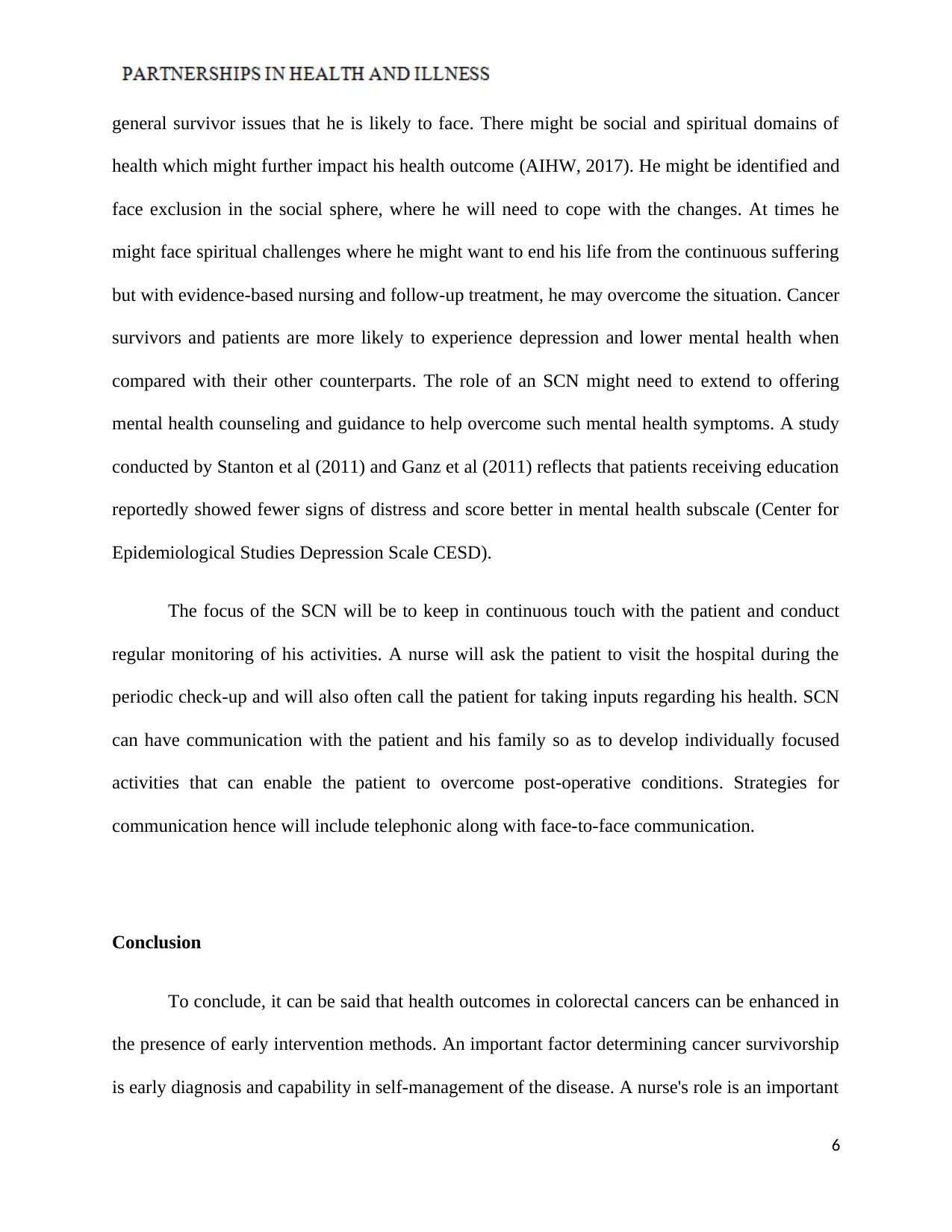
general survivor issues that he is likely to face. There might be social and spiritual domains of
health which might further impact his health outcome (AIHW, 2017). He might be identified and
face exclusion in the social sphere, where he will need to cope with the changes. At times he
might face spiritual challenges where he might want to end his life from the continuous suffering
but with evidence-based nursing and follow-up treatment, he may overcome the situation. Cancer
survivors and patients are more likely to experience depression and lower mental health when
compared with their other counterparts. The role of an SCN might need to extend to offering
mental health counseling and guidance to help overcome such mental health symptoms. A study
conducted by Stanton et al (2011) and Ganz et al (2011) reflects that patients receiving education
reportedly showed fewer signs of distress and score better in mental health subscale (Center for
Epidemiological Studies Depression Scale CESD).
The focus of the SCN will be to keep in continuous touch with the patient and conduct
regular monitoring of his activities. A nurse will ask the patient to visit the hospital during the
periodic check-up and will also often call the patient for taking inputs regarding his health. SCN
can have communication with the patient and his family so as to develop individually focused
activities that can enable the patient to overcome post-operative conditions. Strategies for
communication hence will include telephonic along with face-to-face communication.
Conclusion
To conclude, it can be said that health outcomes in colorectal cancers can be enhanced in
the presence of early intervention methods. An important factor determining cancer survivorship
is early diagnosis and capability in self-management of the disease. A nurse's role is an important
6
health which might further impact his health outcome (AIHW, 2017). He might be identified and
face exclusion in the social sphere, where he will need to cope with the changes. At times he
might face spiritual challenges where he might want to end his life from the continuous suffering
but with evidence-based nursing and follow-up treatment, he may overcome the situation. Cancer
survivors and patients are more likely to experience depression and lower mental health when
compared with their other counterparts. The role of an SCN might need to extend to offering
mental health counseling and guidance to help overcome such mental health symptoms. A study
conducted by Stanton et al (2011) and Ganz et al (2011) reflects that patients receiving education
reportedly showed fewer signs of distress and score better in mental health subscale (Center for
Epidemiological Studies Depression Scale CESD).
The focus of the SCN will be to keep in continuous touch with the patient and conduct
regular monitoring of his activities. A nurse will ask the patient to visit the hospital during the
periodic check-up and will also often call the patient for taking inputs regarding his health. SCN
can have communication with the patient and his family so as to develop individually focused
activities that can enable the patient to overcome post-operative conditions. Strategies for
communication hence will include telephonic along with face-to-face communication.
Conclusion
To conclude, it can be said that health outcomes in colorectal cancers can be enhanced in
the presence of early intervention methods. An important factor determining cancer survivorship
is early diagnosis and capability in self-management of the disease. A nurse's role is an important
6

determinant in perceiving susceptibility, threat, and severity to bring about the behavioral change
in the patient. With regular individual monitoring and self-management, a patient can have an
improved life outcome.
7
in the patient. With regular individual monitoring and self-management, a patient can have an
improved life outcome.
7
Paraphrase This Document
Need a fresh take? Get an instant paraphrase of this document with our AI Paraphraser
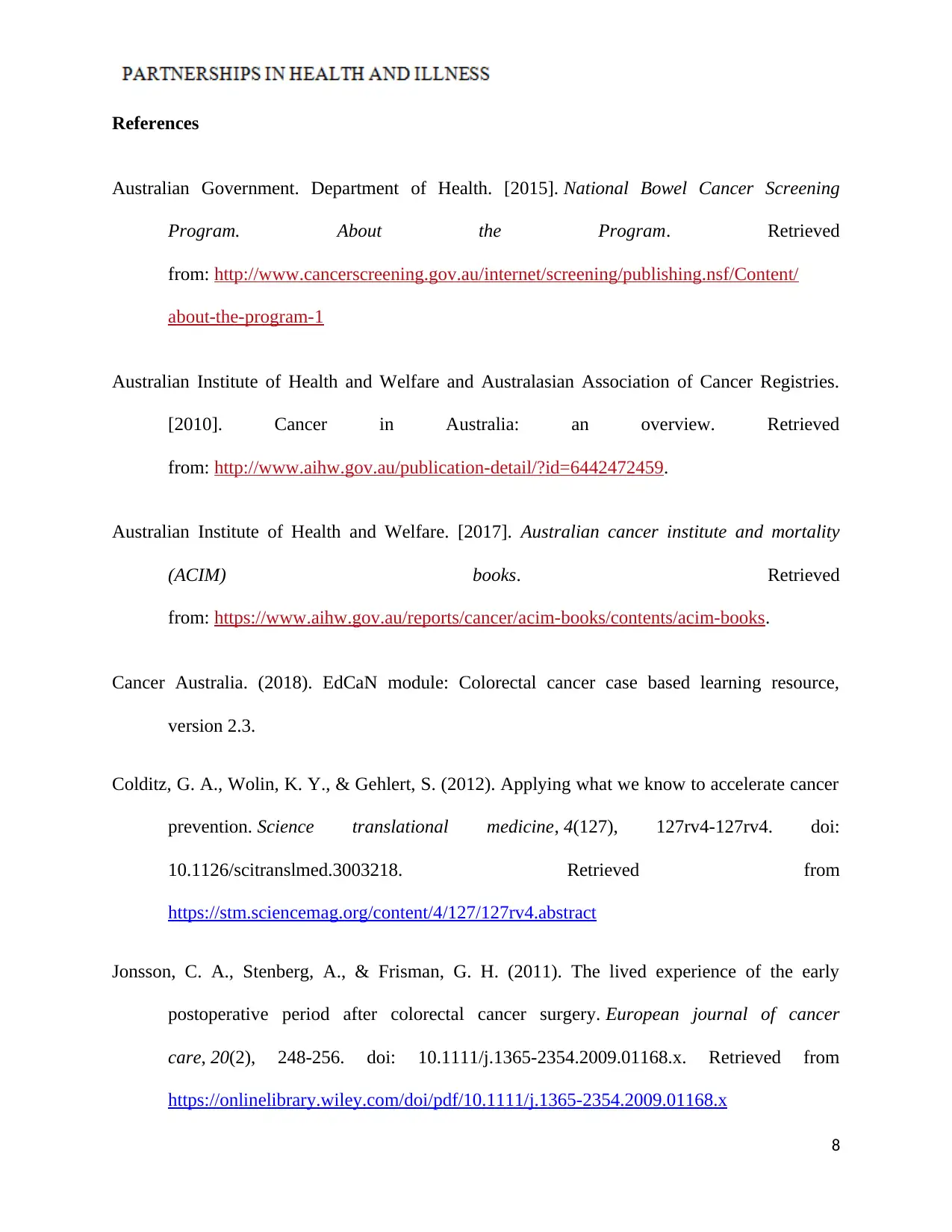
References
Australian Government. Department of Health. [2015]. National Bowel Cancer Screening
Program. About the Program. Retrieved
from: http://www.cancerscreening.gov.au/internet/screening/publishing.nsf/Content/
about-the-program-1
Australian Institute of Health and Welfare and Australasian Association of Cancer Registries.
[2010]. Cancer in Australia: an overview. Retrieved
from: http://www.aihw.gov.au/publication-detail/?id=6442472459.
Australian Institute of Health and Welfare. [2017]. Australian cancer institute and mortality
(ACIM) books. Retrieved
from: https://www.aihw.gov.au/reports/cancer/acim-books/contents/acim-books.
Cancer Australia. (2018). EdCaN module: Colorectal cancer case based learning resource,
version 2.3.
Colditz, G. A., Wolin, K. Y., & Gehlert, S. (2012). Applying what we know to accelerate cancer
prevention. Science translational medicine, 4(127), 127rv4-127rv4. doi:
10.1126/scitranslmed.3003218. Retrieved from
https://stm.sciencemag.org/content/4/127/127rv4.abstract
Jonsson, C. A., Stenberg, A., & Frisman, G. H. (2011). The lived experience of the early
postoperative period after colorectal cancer surgery. European journal of cancer
care, 20(2), 248-256. doi: 10.1111/j.1365-2354.2009.01168.x. Retrieved from
https://onlinelibrary.wiley.com/doi/pdf/10.1111/j.1365-2354.2009.01168.x
8
Australian Government. Department of Health. [2015]. National Bowel Cancer Screening
Program. About the Program. Retrieved
from: http://www.cancerscreening.gov.au/internet/screening/publishing.nsf/Content/
about-the-program-1
Australian Institute of Health and Welfare and Australasian Association of Cancer Registries.
[2010]. Cancer in Australia: an overview. Retrieved
from: http://www.aihw.gov.au/publication-detail/?id=6442472459.
Australian Institute of Health and Welfare. [2017]. Australian cancer institute and mortality
(ACIM) books. Retrieved
from: https://www.aihw.gov.au/reports/cancer/acim-books/contents/acim-books.
Cancer Australia. (2018). EdCaN module: Colorectal cancer case based learning resource,
version 2.3.
Colditz, G. A., Wolin, K. Y., & Gehlert, S. (2012). Applying what we know to accelerate cancer
prevention. Science translational medicine, 4(127), 127rv4-127rv4. doi:
10.1126/scitranslmed.3003218. Retrieved from
https://stm.sciencemag.org/content/4/127/127rv4.abstract
Jonsson, C. A., Stenberg, A., & Frisman, G. H. (2011). The lived experience of the early
postoperative period after colorectal cancer surgery. European journal of cancer
care, 20(2), 248-256. doi: 10.1111/j.1365-2354.2009.01168.x. Retrieved from
https://onlinelibrary.wiley.com/doi/pdf/10.1111/j.1365-2354.2009.01168.x
8
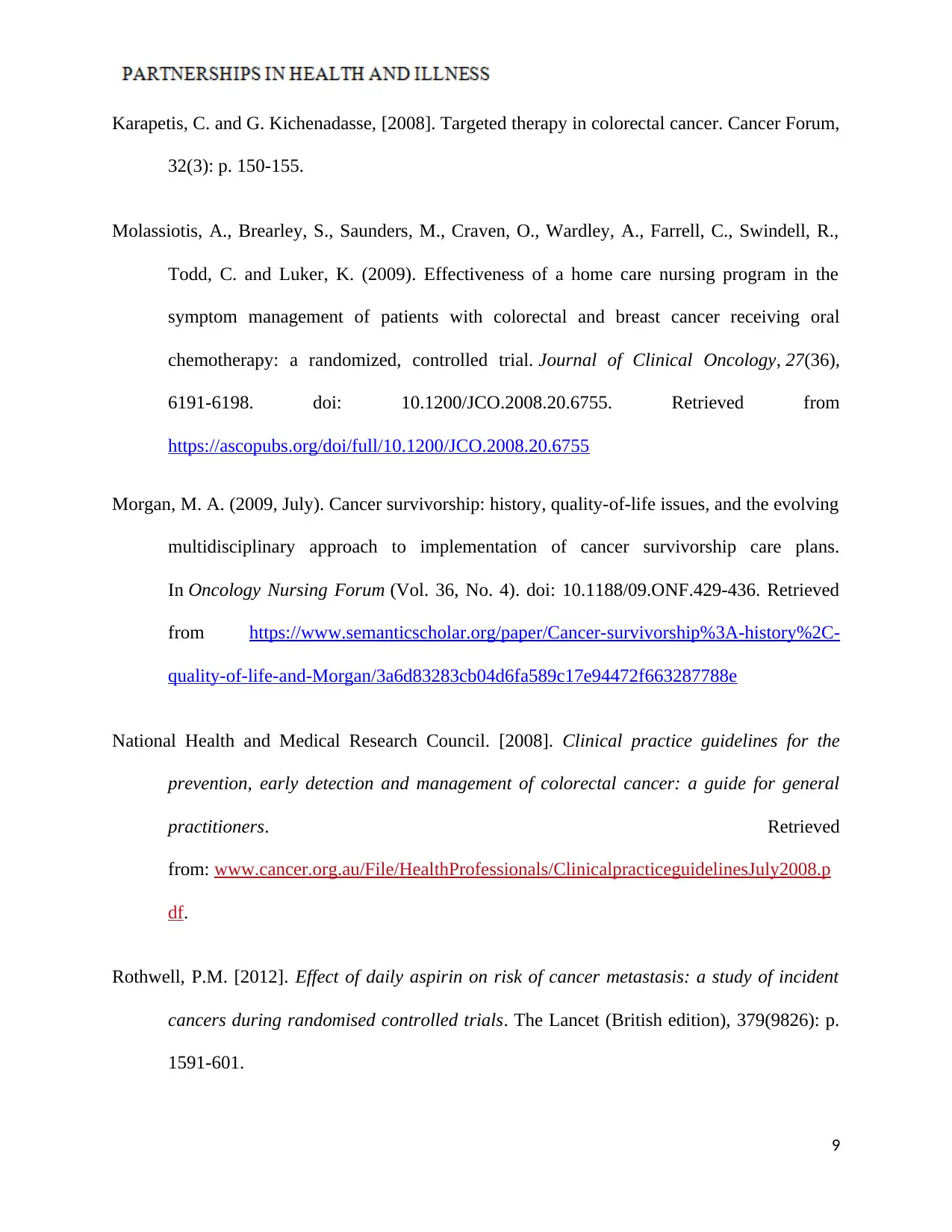
Karapetis, C. and G. Kichenadasse, [2008]. Targeted therapy in colorectal cancer. Cancer Forum,
32(3): p. 150-155.
Molassiotis, A., Brearley, S., Saunders, M., Craven, O., Wardley, A., Farrell, C., Swindell, R.,
Todd, C. and Luker, K. (2009). Effectiveness of a home care nursing program in the
symptom management of patients with colorectal and breast cancer receiving oral
chemotherapy: a randomized, controlled trial. Journal of Clinical Oncology, 27(36),
6191-6198. doi: 10.1200/JCO.2008.20.6755. Retrieved from
https://ascopubs.org/doi/full/10.1200/JCO.2008.20.6755
Morgan, M. A. (2009, July). Cancer survivorship: history, quality-of-life issues, and the evolving
multidisciplinary approach to implementation of cancer survivorship care plans.
In Oncology Nursing Forum (Vol. 36, No. 4). doi: 10.1188/09.ONF.429-436. Retrieved
from https://www.semanticscholar.org/paper/Cancer-survivorship%3A-history%2C-
quality-of-life-and-Morgan/3a6d83283cb04d6fa589c17e94472f663287788e
National Health and Medical Research Council. [2008]. Clinical practice guidelines for the
prevention, early detection and management of colorectal cancer: a guide for general
practitioners. Retrieved
from: www.cancer.org.au/File/HealthProfessionals/ClinicalpracticeguidelinesJuly2008.p
df.
Rothwell, P.M. [2012]. Effect of daily aspirin on risk of cancer metastasis: a study of incident
cancers during randomised controlled trials. The Lancet (British edition), 379(9826): p.
1591-601.
9
32(3): p. 150-155.
Molassiotis, A., Brearley, S., Saunders, M., Craven, O., Wardley, A., Farrell, C., Swindell, R.,
Todd, C. and Luker, K. (2009). Effectiveness of a home care nursing program in the
symptom management of patients with colorectal and breast cancer receiving oral
chemotherapy: a randomized, controlled trial. Journal of Clinical Oncology, 27(36),
6191-6198. doi: 10.1200/JCO.2008.20.6755. Retrieved from
https://ascopubs.org/doi/full/10.1200/JCO.2008.20.6755
Morgan, M. A. (2009, July). Cancer survivorship: history, quality-of-life issues, and the evolving
multidisciplinary approach to implementation of cancer survivorship care plans.
In Oncology Nursing Forum (Vol. 36, No. 4). doi: 10.1188/09.ONF.429-436. Retrieved
from https://www.semanticscholar.org/paper/Cancer-survivorship%3A-history%2C-
quality-of-life-and-Morgan/3a6d83283cb04d6fa589c17e94472f663287788e
National Health and Medical Research Council. [2008]. Clinical practice guidelines for the
prevention, early detection and management of colorectal cancer: a guide for general
practitioners. Retrieved
from: www.cancer.org.au/File/HealthProfessionals/ClinicalpracticeguidelinesJuly2008.p
df.
Rothwell, P.M. [2012]. Effect of daily aspirin on risk of cancer metastasis: a study of incident
cancers during randomised controlled trials. The Lancet (British edition), 379(9826): p.
1591-601.
9
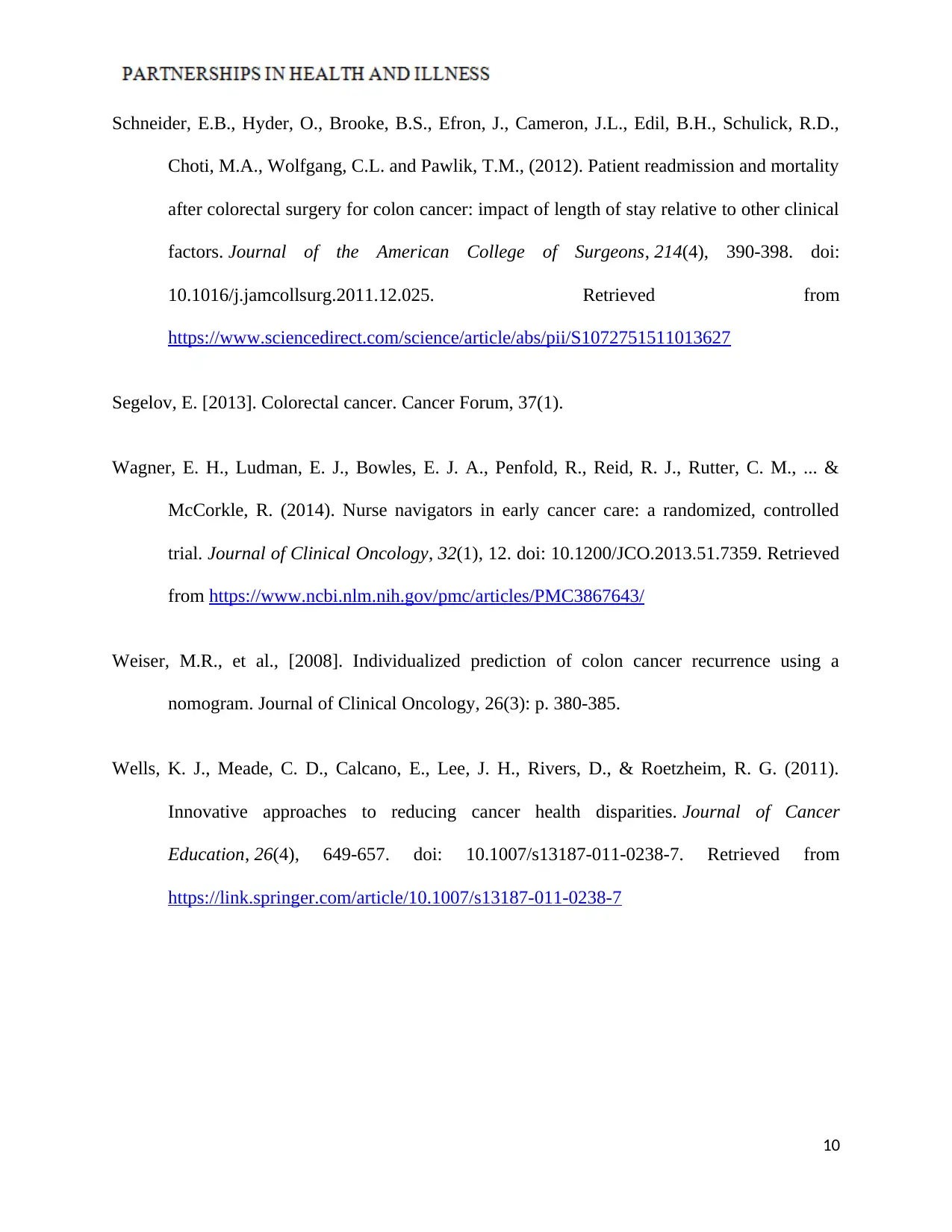
Schneider, E.B., Hyder, O., Brooke, B.S., Efron, J., Cameron, J.L., Edil, B.H., Schulick, R.D.,
Choti, M.A., Wolfgang, C.L. and Pawlik, T.M., (2012). Patient readmission and mortality
after colorectal surgery for colon cancer: impact of length of stay relative to other clinical
factors. Journal of the American College of Surgeons, 214(4), 390-398. doi:
10.1016/j.jamcollsurg.2011.12.025. Retrieved from
https://www.sciencedirect.com/science/article/abs/pii/S1072751511013627
Segelov, E. [2013]. Colorectal cancer. Cancer Forum, 37(1).
Wagner, E. H., Ludman, E. J., Bowles, E. J. A., Penfold, R., Reid, R. J., Rutter, C. M., ... &
McCorkle, R. (2014). Nurse navigators in early cancer care: a randomized, controlled
trial. Journal of Clinical Oncology, 32(1), 12. doi: 10.1200/JCO.2013.51.7359. Retrieved
from https://www.ncbi.nlm.nih.gov/pmc/articles/PMC3867643/
Weiser, M.R., et al., [2008]. Individualized prediction of colon cancer recurrence using a
nomogram. Journal of Clinical Oncology, 26(3): p. 380-385.
Wells, K. J., Meade, C. D., Calcano, E., Lee, J. H., Rivers, D., & Roetzheim, R. G. (2011).
Innovative approaches to reducing cancer health disparities. Journal of Cancer
Education, 26(4), 649-657. doi: 10.1007/s13187-011-0238-7. Retrieved from
https://link.springer.com/article/10.1007/s13187-011-0238-7
10
Choti, M.A., Wolfgang, C.L. and Pawlik, T.M., (2012). Patient readmission and mortality
after colorectal surgery for colon cancer: impact of length of stay relative to other clinical
factors. Journal of the American College of Surgeons, 214(4), 390-398. doi:
10.1016/j.jamcollsurg.2011.12.025. Retrieved from
https://www.sciencedirect.com/science/article/abs/pii/S1072751511013627
Segelov, E. [2013]. Colorectal cancer. Cancer Forum, 37(1).
Wagner, E. H., Ludman, E. J., Bowles, E. J. A., Penfold, R., Reid, R. J., Rutter, C. M., ... &
McCorkle, R. (2014). Nurse navigators in early cancer care: a randomized, controlled
trial. Journal of Clinical Oncology, 32(1), 12. doi: 10.1200/JCO.2013.51.7359. Retrieved
from https://www.ncbi.nlm.nih.gov/pmc/articles/PMC3867643/
Weiser, M.R., et al., [2008]. Individualized prediction of colon cancer recurrence using a
nomogram. Journal of Clinical Oncology, 26(3): p. 380-385.
Wells, K. J., Meade, C. D., Calcano, E., Lee, J. H., Rivers, D., & Roetzheim, R. G. (2011).
Innovative approaches to reducing cancer health disparities. Journal of Cancer
Education, 26(4), 649-657. doi: 10.1007/s13187-011-0238-7. Retrieved from
https://link.springer.com/article/10.1007/s13187-011-0238-7
10
1 out of 10
Related Documents
Your All-in-One AI-Powered Toolkit for Academic Success.
+13062052269
info@desklib.com
Available 24*7 on WhatsApp / Email
![[object Object]](/_next/static/media/star-bottom.7253800d.svg)
Unlock your academic potential
© 2024 | Zucol Services PVT LTD | All rights reserved.




